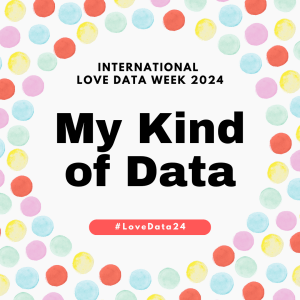Research Data Stewardship at UCL
By Rafael, on 13 February 2024
Guest post by James A J Wilson, Head of Research Data in Advance Research Computing at UCL, in celebration of International Love Data Week 2024.
A Research Data Steward is a relatively recent term for someone undertaking a range of jobs that have already been undertaken for some time, albeit sometimes without due appreciation. If you have helped researchers manage their data – helping with data management plans, adding metadata, providing services for data hosting, preparing datasets for analysis, scripting data transformations, readying data for sharing or publication, or engaging in long-term data preservation and curation – you may have unwittingly been a data steward.
As the importance of data for enabling research reproducibility and transparency becomes more widely recognized, so does the importance of good data stewardship. In 2016, the European Commission’s publication ‘Realising the European Open Science Cloud’, estimated that, “on average, about 5% of research expenditure should be spent on properly managing and stewarding data”[1]. Whilst the world and UCL are not at that level yet, the importance of managing research data more effectively has not passed the university by.
Advanced Research Computing (ARC) has established four different Research Technology professions. Besides our Research Software Engineers (who already have more than a decade of experience behind them at UCL) there are now groups of Research Infrastructure Developers, Data Scientists, and Data Stewards. None of the roles that the teams take on are new, but there are advantages to treating the people who make up those professions as members of a profession, rather than assorted and frequently rather isolated postdocs. Firstly, we now have a pool of people who can exchange experiences, impart knowledge to one another, and lend each other a bit of moral support. Secondly, it enables the development of focused career paths. No longer do research technology professionals need to kick their heels working on barely recognized tasks until they get an opportunity to break into the research big time. Their importance is recognized and can be rewarded.
There are now more than a dozen professional research data stewards in ARC. Team members develop and support services, collaborate with research teams from other departments to ensure that their data is as well managed and as FAIR as possible (Findable, Accessible, Interoperable, and Reusable), and undertake research themselves. Examples of research projects include work with eChild; preparing data packs for the Medical Research Council Clinical Trials Unit (MRC CTU); supplying the MAESaM and CAAL archaeology projects with geospatial data and mapping software expertise and helping to prepare bids across a range of disciplines. Some projects are more infrastructure based, such as the EU-funded DICE project to establish services for data processing pipelines. Other work is focused on improving UCL’s services and their coordination, such as the ‘3rd-party data’ project, which seeks to help researchers obtain data from other organisations and enable broader awareness of and access to that data. We’re also working with departments, helping them migrate data to centrally managed storage.
The ARC Research Data Stewards are not the only people engaged in data stewardship at UCL. Many people across different projects and teams are involved in aspects of data stewardship. Most obviously, our close colleagues in UCL Library’s Research Data Management team, but also those working on services to provide particular datasets or metadata, plus all those on research contracts working away at polishing and processing data in labs, libraries, and offices across Bloomsbury and beyond. We will shortly begin forming a Data Stewardship Community of Practice, to create a forum where everyone involved in this important work can exchange ideas and start to form a sense of what really constitutes ‘best practice’.
If you are based at UCL and are potentially interested in working with us, drop us a line at researchdata-support@ucl.ac.uk.
Get involved!
The UCL Office for Open Science and Scholarship invites you to contribute to the open science and scholarship movement. Stay connected for updates, events, and opportunities. Follow us on X, formerly Twitter, and join our mailing list to be part of the conversation!
[1] European Commission, Directorate-General for Research and Innovation, Realising the European open science cloud – First report and recommendations of the Commission high level expert group on the European open science cloud, Publications Office, 2016, https://data.europa.eu/doi/10.2777/940154
 Close
Close






